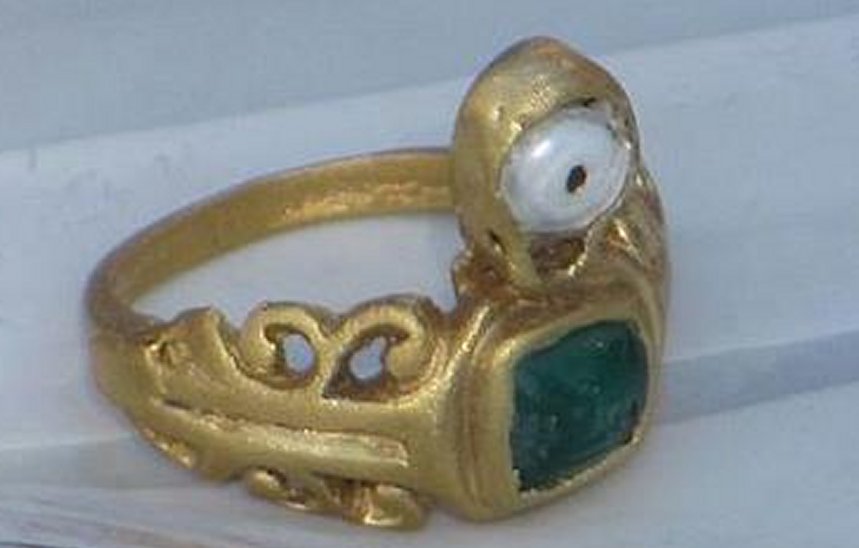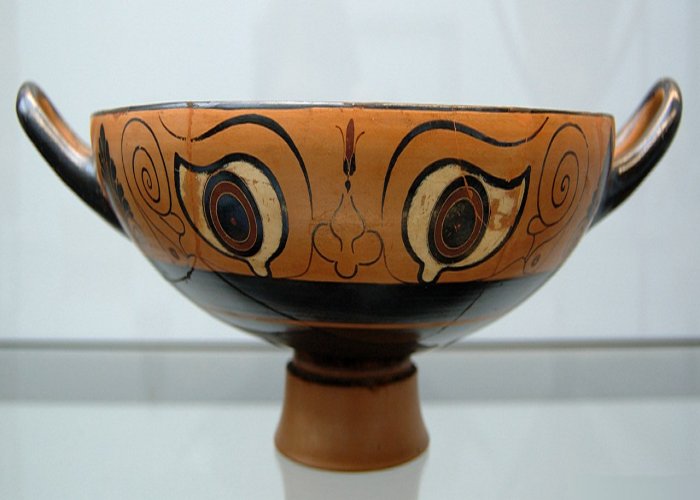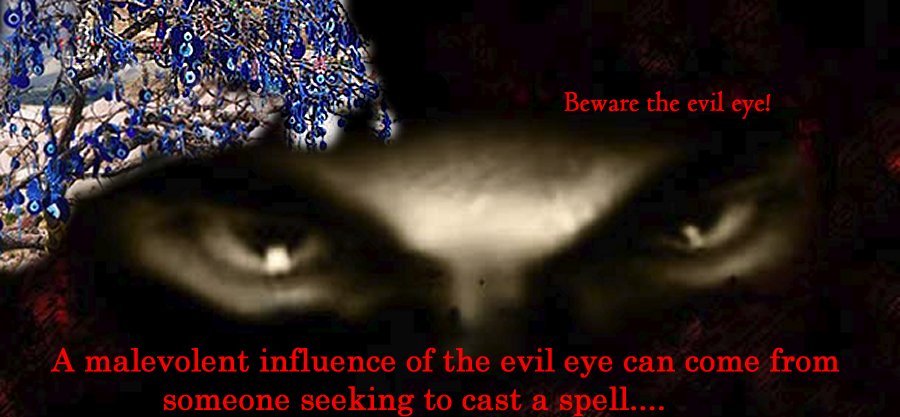Curse Of Evil Eye: Powerful Ancient Belief That Still Frightens People Around The World
A. Sutherland - AncientPages.com - There is an ancient, superstitious, and almost universal belief that certain people possess the supernatural power to cause disaster, illness, calamity, and even death.
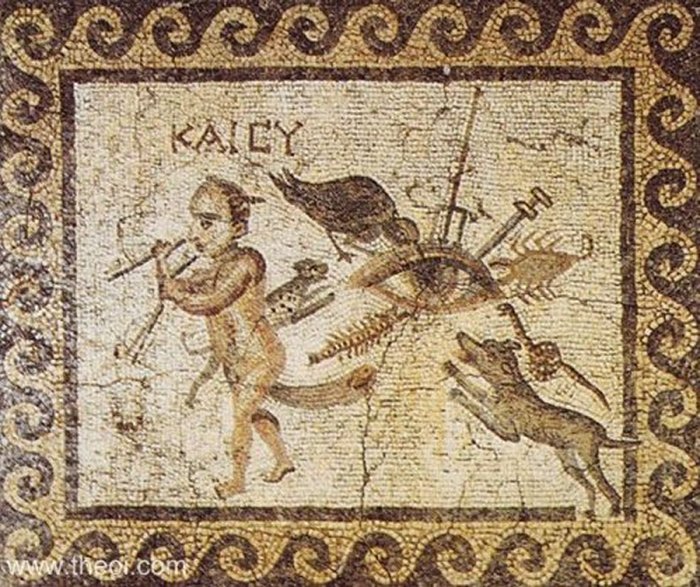 Mosaic from the House of the Evil Eye, Antioch, Syria. Credits: Archaeological Museum, Antakya
Mosaic from the House of the Evil Eye, Antioch, Syria. Credits: Archaeological Museum, Antakya
They can do it with a gaze or stare that gives an unpleasant emotion. The evil eye is widely feared in many parts of the world.
The oldest accounts of the evil eye went back to at least 3000 BC and were mentioned in the Sumerian, Babylonian, and Assyrian cuneiform texts. The ancient people of Mexico and Central America feared the power of the evil eye, as did the ancient Egyptians, Greeks, and Romans, who were particularly afraid of it.
Also, the Old and New Testaments of the Bible mention the evil eye in the celebrated "Sermon on the Mount," Jesus of Nazareth makes reference to the malignity of the Evil Eye:
Matthew 6:22-23 says,
"The light of the body is the eye: if therefore thine eye be single, thy whole body shall be full of light. But if thine eye be evil, thy whole body shall be full of darkness…"
A Ruby Eye Pendant from an ancient civilization in Mesopotamia was possibly used as an amulet to protect against evil eyes. Adilnor Collection. Image credit: Danieliness - CC BY-SA 3.0
Proverbs 28:22 says: "A man with an evil eye hastens after wealth and does not know that want will come upon him."
According to Western science, evil eye beliefs are not based on anything other than superstition.
The Evil Eye Was Feared In Many Ancient Cultures
Strangely, superstitions related to the evil eye are continuously prevalent in certain European countries, especially in the region of the Mediterranean, but also in Central America and Mexico. In North India, there is also a strong belief in the evil eye. The so-called "Buri Nazar" and a tattoo or an amulet are used to ward off the evil eye.
Different tribes have always feared the evil eye. Ancient beliefs say that medicine men, witch doctors, and sorcerers are among those who can cast evil eyes and bring bad luck. According to Native American beliefs, the so-called 'death-dealing evil eye power is possessed by tribal shamans.
Ring from the 3rd century, found in Croatia. The ring has a drawn rabbit that tastes like a flower, and that was seen as a symbol of happiness, while the "eye" represents protection against disasters and spells" Image credit: Croatian Times.
Also, other people can be the so-called 'iettatore' (or 'jettatore'); they naturally have an evil eye and bring bad luck. By looking at the target, they have an evil influence on another person, animal, object, or building.
It can be done deliberately by individuals seeking to cast a spell or unintentionally by individuals unaware of their evil power.
There are recorded cases of individuals suspected of being cursed with the evil eye from birth and did not even know about it. Two examples can be Pope Leo XIII and Pope Pius IX, who were said to possess the evil eye.
Kylix eye cup (530–520 BC), inscribed with Chalcidian text. It features an eye motif, to ward off the evil eye. Uploader: :Bibi Saint-Pol- Public Domain
According to ancient beliefs, one must be constantly guarded against the danger of someone's evil - though often - unintentional stare. This destructive influence of the evil eye may come from a stranger who, for example, admires one's children or a child; the evil eye can also dangerously affect an animal, a pregnant woman, and very happy and prosperous people.
Amulets That Ward Off The Evil Eye
There is a belief that beads, hand gestures, sayings, and amulets may help to ward off a dangerous gaze. These beads represent a powerful symbol of protection against the evil eye. In northern India and Pakistan, the rudraksha tree, or 'Eleacarpus ganitrus', grows, and the bead is actually its fruit, which shrivels to a hard, wood-like texture.
The ancient Romans used phallic amulets associated with their phallic God, Priapus ('Fascinus').
Hamsa, for example, is an ancient, powerful symbol often carried as an amulet to invoke God's hand or counteract the Evil Eye. From this, God's name originates the word 'fascination' and 'bewitchment.'
Interestingly, it is widely believed that men possess more evil eye power than women today.
Written by – A. Sutherland AncientPages.com Staff Writer
Updated on February 28, 2023
Copyright © AncientPages.com All rights reserved. This material may not be published, broadcast, rewritten or redistributed in whole or part without the express written permission of AncientPages.com
Expand for referencesReferences:
Dundes A. The Evil Eye: A Casebook
Elliot, John H. Beware the Evil Eye; The Evil Eye in the Bible and the Ancient World: Volume One
Bohak, Ancient Jewish Magic
A. Ross, Hypothesis: The Electrophysiological Basis of Evil Eye Belief
More From Ancient Pages
-
 Trajan’s Market Was The World’s First Known Shopping Mall
Ancient History Facts | Jul 2, 2016
Trajan’s Market Was The World’s First Known Shopping Mall
Ancient History Facts | Jul 2, 2016 -
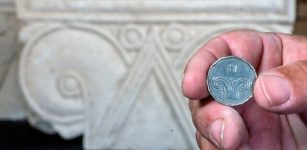 Palace From The Time Of The Kings Of Judah – Unearthed In Jerusalem
Archaeology | Sep 5, 2020
Palace From The Time Of The Kings Of Judah – Unearthed In Jerusalem
Archaeology | Sep 5, 2020 -
 10 Ancient Fortresses Of Historical Importance
Civilizations | Jan 11, 2016
10 Ancient Fortresses Of Historical Importance
Civilizations | Jan 11, 2016 -
 Pazzi Conspiracy – Failed Murder Attempt On Lorenzo de’ Medici Made Him Even More Powerful And Threw Renaissance Florence Into Chaos
Featured Stories | Feb 14, 2025
Pazzi Conspiracy – Failed Murder Attempt On Lorenzo de’ Medici Made Him Even More Powerful And Threw Renaissance Florence Into Chaos
Featured Stories | Feb 14, 2025 -
 ‘Joyeuse’ – Legendary Sword With Relics Of Saints Was A Private Treasure Of Emperor Charlemagne
Artifacts | Dec 24, 2021
‘Joyeuse’ – Legendary Sword With Relics Of Saints Was A Private Treasure Of Emperor Charlemagne
Artifacts | Dec 24, 2021 -
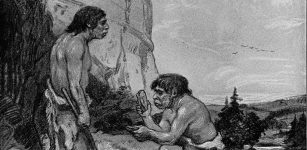 Unraveling The Mystery Of How Our Ancestors Created The First Spoken Words
Archaeology | Dec 6, 2021
Unraveling The Mystery Of How Our Ancestors Created The First Spoken Words
Archaeology | Dec 6, 2021 -
 Nicholas Roerich’s Search For Shambhala And Wish To Fulfill The Mysterious Buddhist Prophecy
Ancient Mysteries | Nov 4, 2016
Nicholas Roerich’s Search For Shambhala And Wish To Fulfill The Mysterious Buddhist Prophecy
Ancient Mysteries | Nov 4, 2016 -
 Has The Tomb Of The Real Santa Claus Been Found In Turkey?
News | Oct 5, 2017
Has The Tomb Of The Real Santa Claus Been Found In Turkey?
News | Oct 5, 2017 -
 Palnatoke – Founder Of The Jomsvikings Brotherhood, Legendary Danish Hero And Enemy Of King Harald Bluetooth
Historical Figures | Nov 2, 2016
Palnatoke – Founder Of The Jomsvikings Brotherhood, Legendary Danish Hero And Enemy Of King Harald Bluetooth
Historical Figures | Nov 2, 2016 -
 A Stone Age Child Buried With Bird Feathers, Plant Fibers And Fur Investigated In Finland
Archaeology | Nov 2, 2022
A Stone Age Child Buried With Bird Feathers, Plant Fibers And Fur Investigated In Finland
Archaeology | Nov 2, 2022 -
 From A Modest Town Jerusalem Has Evolved Into A Grand Metropolis
Archaeology | Sep 24, 2024
From A Modest Town Jerusalem Has Evolved Into A Grand Metropolis
Archaeology | Sep 24, 2024 -
 Evidence For A Divergence Between Eastern And Western Mediterranean Indo-European Languages Finally Provided By Ancient Genomics Study
Archaeology | Jan 4, 2025
Evidence For A Divergence Between Eastern And Western Mediterranean Indo-European Languages Finally Provided By Ancient Genomics Study
Archaeology | Jan 4, 2025 -
 Impressive Gaulcross Hoard Reveals Secrets Of Mysterious Picts
News | Jun 20, 2016
Impressive Gaulcross Hoard Reveals Secrets Of Mysterious Picts
News | Jun 20, 2016 -
 Geronimo: Story About This Western Indian Chief Will Never Die
Featured Stories | Jul 21, 2018
Geronimo: Story About This Western Indian Chief Will Never Die
Featured Stories | Jul 21, 2018 -
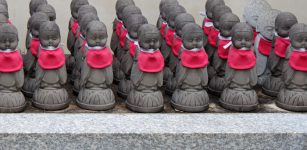 Jizo – Protector Of Children, Travelers And Women In Japanese Mythology
Featured Stories | Dec 23, 2015
Jizo – Protector Of Children, Travelers And Women In Japanese Mythology
Featured Stories | Dec 23, 2015 -
 University Of Warsaw Archaeologists Return To Study Large Ancient City Of Ptolemais
Archaeology | Sep 8, 2023
University Of Warsaw Archaeologists Return To Study Large Ancient City Of Ptolemais
Archaeology | Sep 8, 2023 -
 Sigurd Fafnirsbane – Legendary Dragon Slaying Warrior And His Magical Sword
Featured Stories | Oct 30, 2017
Sigurd Fafnirsbane – Legendary Dragon Slaying Warrior And His Magical Sword
Featured Stories | Oct 30, 2017 -
 On This Day In History: ‘Sue’ Largest Tyrannosaurus Rex Skeleton Discovered In South Dakota – On August 12, 1990
News | Aug 12, 2016
On This Day In History: ‘Sue’ Largest Tyrannosaurus Rex Skeleton Discovered In South Dakota – On August 12, 1990
News | Aug 12, 2016 -
 Earth’s First Animals Had Particular Taste In Real Estate
Evolution | May 10, 2023
Earth’s First Animals Had Particular Taste In Real Estate
Evolution | May 10, 2023 -
 Archaeologist Ludovic Slimak Wants To Rewrite The History Of Early Humans In Europe
Evolution | Jun 10, 2023
Archaeologist Ludovic Slimak Wants To Rewrite The History Of Early Humans In Europe
Evolution | Jun 10, 2023


